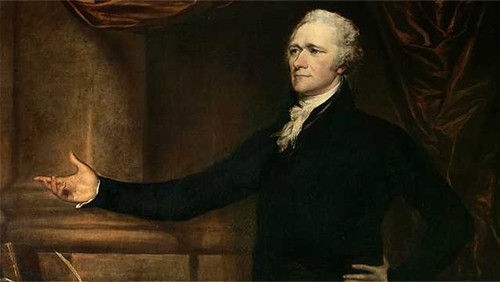Oops, Hamilton Did Own Slaves

One of the central conflicts of Hamilton: An American Musical is the pull of Lin-Manuel Miranda's catchy rhymes versus your desire to escape the mockery of your cool friends, but another is between Northern Hamilton and his Southern frenemy, Thomas Jefferson, and all the stickiness that implies in the late 18th century. Throughout the musical, Hamilton passionately argues against slavery, most blisteringly in the first of two cabinet meetings presented as rap battles (just go with it), where he raps at Jefferson:
Hey neighbor, your debts are paid 'cause you don't pay for labor/'We plant seeds in the South, we create'/Yeah, keep ranting, we know who's really doing the planting
Don't Miss
But academically minded musical theater fans (all 12 of them) should keep in mind that Hamilton is a lot more about a specific story Miranda wanted to tell than Hamilton's life. As such, it plays faster and looser with the facts than your high school boyfriend's jeans tailing a bullet train, but it didn't help that Miranda's primary inspiration, Ron Chernow's 2004 biography Alexander Hamilton, shied away from some uncomfortable facts itself. Chernow acknowledges that Hamilton procured slaves for his in-laws, who were "some of the largest slaveholders in the area," and that Hamilton and his wife themselves "may have owned one of two household slaves," but insists that his upbringing in St. Croix left him an "uncompromising abolitionist" with "a settled antipathy toward slavery." You know, kind of like how you might be a vegetarian except on Super Bowl Sunday, except nothing like that.

Completely unsurprisingly, given the norms of rich white men at the time, new research by historical interpreter Jessie Serfilippi shows that Hamilton seems to have owned more slaves than frilly cravats. Letters to his associates make vague references to possible human-for-money transactions in language that's hard to decipher two and a half centuries removed, but the $10 Founding Father's cash books are much more damning.
Several letters to his father-in-law mention "maids" accompanying Mrs. Hamilton on her travels, but he doesn't appear to have been paying them, and around the same time, he was apparently renting a boy to someone else in a disappointingly un-George Rekersian way. An inventory of the family's assets at the time of Hamilton's death lists several "servants" and their monetary value, and a particularly incriminating entry from March 1798 lists a payment to his father-in-law for two Black "servants purchased by him for me." It doesn't get much plainer than that.
To give microscopic credit where it's due, Hamilton did criticize slavery and even joined the New-York Manumission Society, an organization that advocated "gradual abolition" before it was cool. But he was also Venmo-ing his in-laws for people the same way you would for cocktails at brunch, so putting those fiery disses in his mouth is more than a little dubious. Never get too attached to historical figures, kids. They'll only break your heart.
Top image: The Walt Disney Company